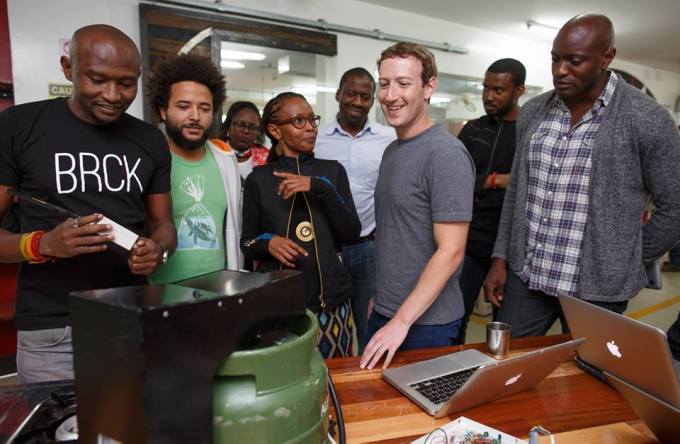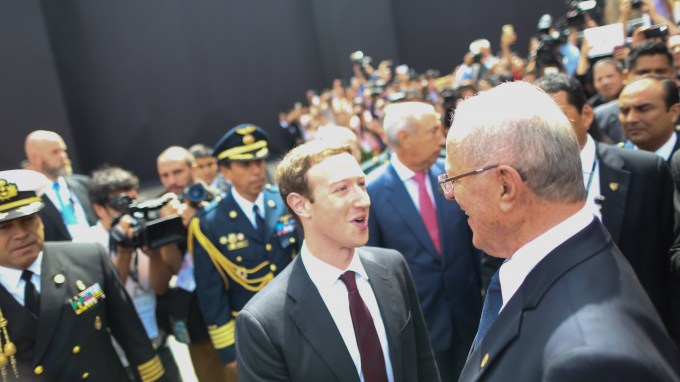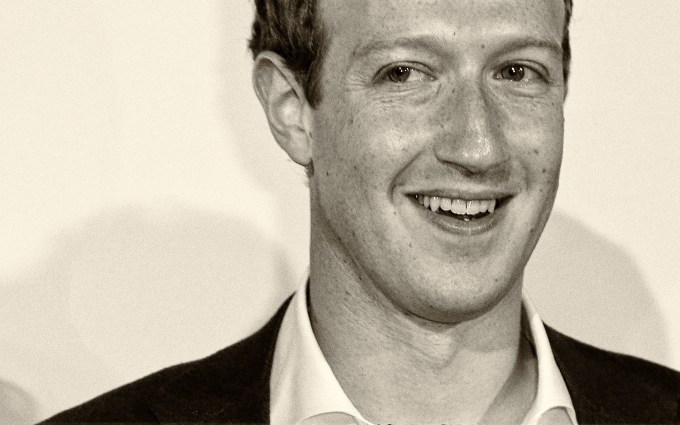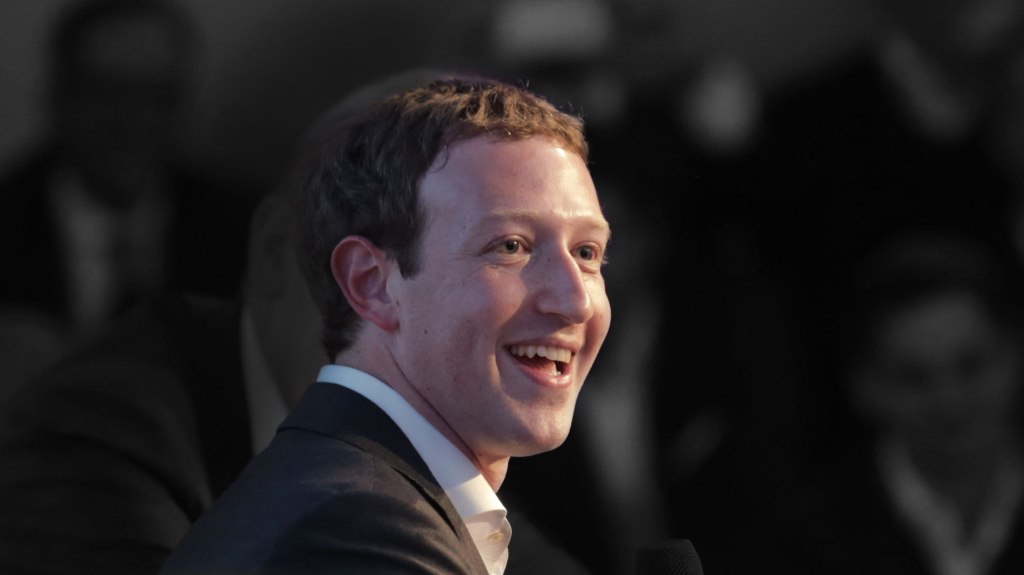“Are we building the world we all want?” That’s a question often reserved for the lips of presidents and religious leaders, and too rarely asked by CEOs. But technology has risen as a force that unites us, alongside government and faith. So too must captains of industry rise to accept their opportunity of influence, for the betterment of humanity in one of its most volatile moments.
Mark Zuckerberg never saw Facebook as just a business, and so never accepted his role as just a businessman.
Five years ago, in Zuckerberg’s pre-IPO letter to Facebook investors, he wrote, “There is a huge need and a huge opportunity to get everyone in the world connected, to give everyone a voice and to help transform society for the future.”
Now with Facebook reaching 1.86 billion users and building technology to expand internet access everywhere, his constituency exceeds that of any nation. He’s made monumental strides toward steps 1 and 2.
Today, Zuckerberg offers a vision and rallying call for working toward step 3 — to “develop the social infrastructure to give people the power to build a global community that works for all of us.” He’s just published the 5,000-word letter embedded below, establishing the central tenets of the next phase of Facebook’s mission: support, safety, information, civic engagement and inclusion.
In the middle of Facebook’s headquarters, within Zuckerberg’s glass-walled office that increases the transparency of his leadership, he spoke to TechCrunch about his hopes and ideas.
“What’s the most positive thing I can do?”
“When I started Facebook, this idea of connecting the world was not controversial. The default assumption was that the world was moving in that direction and that year after year the world will get more connected,” Zuckerberg tells me. That afforded Facebook a chance to start small, tying friends and family closer.
“Now, I think it’s somewhat of a reaction to globalization and change moving so quickly, but I think there are a lot of people around the world, not just in the U.S., but all different countries, that feel left behind by globalization. And there are movements as a result to push back on furthering global connection.”
Donald Trump is the elephant in Zuckerberg’s aquarium, though he never mentions him by name. While the new president has already done damage to the country’s social fabric, he’s also stirred up passion for change, Zuckerberg recognizes.
“Now you have a lot of people who are asking, ‘Okay, what is the most positive thing that I can do if I’m upset about that?’ My answer is that the most productive thing is not going to be just being upset about it, but actually going and building the long-term infrastructure that can help bring people together,” Zuckerberg explains.

‘Together’ doesn’t just mean liberals seeking change, or the technology set. The first community Zuckerberg addresses in his letter is “people left behind by globalization.” How to educate this population so they can stay hireable as automation progresses is a topic for another day, he says. But Zuckerberg stressed that people need more than just jobs to feel a sense of security.
“When you survey people there is an increase in a sense of lack of hope,” he tells me. “I think a lot of people assume that that is primarily economic and I would certainly bet that a lot of it is economic … but I would bet that more of it than people think is social and is about a lack of sense of community that makes us feel like we are needed and that we are part of something bigger than ourselves.”
Facebook’s ubiquity makes it uniquely suited to breaking through this isolation.
In a way, its ability to interconnect you to a safety net of friends can complement traditional sources of support. Zuckerberg relays how in his travels, church leaders have told him that “when a factory closes in town, they know that a few weeks later they’re going to be seeing couples for marriage counseling.”
The evolving predicament of the working class necessitates an evolving culture of empathy, both offline and online.
Though that same ubiquity can exacerbate inaction. Facebook can be a distraction from civic involvement and community as well as a tool to connect with them. Before the web, political and social outrage had no outlet beyond the physical world. Now Facebook’s relevancy-sorted feed makes it easy to get sucked into the latest scandal, fragmenting our frustration, or numbing us to fire within through cute baby photos and inane gossip.
Facebook may not want to or be able to contradict our natural inclinations to seek and consume entertainment. But Zuckerberg plans to hone Facebook into an implement of our greater ambitions as well.
The modern congregation
Though his letter is philosophical, it also lays out several concrete product developments Facebook is planning to provide this infrastructure.
First, the company will try to counteract the declining participation in local community groups, which Zuckerberg cites has decreased up to 25 percent since the 1970s. Users will see more suggestions to join locally based Facebook Groups. And Facebook will give the leaders of these Groups more tools to communicate with and organize their communities, including options to create ‘sub-communities.’
Zuckerberg says, “One of the things that we’ve seen in online communities, but also including offline communities, is that having an engaged and talented leader is one of the key things for making a strong community … but right now our Groups product hasn’t really been built to facilitate the leaders.”
Instead, it was designed for ad hoc organization of smaller groups, like families, “where there is no ‘leader.’” Zuckerberg didn’t outline specific features, but says, “You can definitely see us building everything that we’ve built for Pages, for Groups.” That might include analytics about what topics are resonating with members, the option to assign a wider variety of admin or moderator roles, and a way to pull in outside apps to expand functionality.
In the right hands, these tools could harness the bristling energy of communities today so individuals feel empowered. Facebook can’t enact change from the top-down, but it can boost the efficiency of grass-roots movements.
Solidarity that respects diversity
Zuckerberg admits in his letter that “Sitting here in California, we’re not best positioned to identify the cultural norms around the world.” Yet, to date, Facebook has relied on a one-size-fits-most set of community standards governing what is acceptable and unacceptable to share in its town square. While it abides by censorship laws in the few countries that require it to, Facebook otherwise has assumed people will have an identical perspective of morality even if they’re thousands of miles apart.
For Facebook to empower all communities, it must also adapt to them, without trampling the unique opinions of the individuals within them.
“With a community of almost two billion people, it is less feasible to have a single set of standards to govern the entire community, so we need to evolve towards a system of more local governance,” Zuckerberg writes. “Europeans more frequently find fault with taking down images depicting nudity, since some European cultures are more accepting of nudity than, for example, many communities in the Middle East or Asia.”
That’s why Facebook plans to allow users to customize their preferences around how much violence, nudity and profanity they see in the app. In what Zuckerberg says is “like a referendum,” users who don’t respond to periodic requests to personalize these controls will be defaulted to the setting selected by the majority of people in their region. Only content more extreme than the most lenient personal settings allow will be barred from Facebook.

To enact this more granular view of what’s objectionable, Facebook plans to ramp up the use of artificial intelligence for flagging questionable posts. “Looking ahead, one of our greatest opportunities to keep people safe is building artificial intelligence to understand more quickly and accurately what is happening across our community,” Zuckerberg says. AI now triggers 30 percent of the reports of suspicious content on Facebook.
Zuckerberg says the goal of this new approach to community governance is that “the Community Standards should reflect the cultural norms of our community, that each person should see as little objectionable content as possible, and each person should be able to share what they want while being told they cannot share something as little as possible.”
That in effect moves Facebook further away from being a “media company,” because it will no longer have a single editorial policy, and instead will allow users to define it for themselves.
Facebook once before tried to give users a direct say in its policies. But this site governance system required 30 percent of users to vote, a massive turnout, for their majority decision to be binding. When 619,000 people voted and 87 percent said they wanted to stop Facebook from intermingling data with Instagram and removing their future right to influence governance, the user base fell short 299.4 million votes, and their agency was curtailed.
The new direction for Facebook governance accepts that not everyone is civically active, and gives those who are more control while providing settings in line with local culture to everyone else.
Depolarizing politics with a spectrum of ideas
The “us versus them” mentality is the antithesis of Zuckerberg’s beliefs. Though while the internet might present a broader range of ideas than living in an isolated town of like-minds, it also establishes a battlefield of ideology where people clash. And through the referral traffic and subsequent ad revenue Facebook delivers, it incentivizes sensationalism that divides the populace into oppositional forces.
Facebook has been hit with the brunt of the blame for the fake news phenomenon, though it’s fighting back against misinformation with outside fact checkers and more features. It’s also been criticized for the apparent contradiction of pushing for unity and openness, while retaining Trump advisor Peter Thiel on its board of directors and reportedly prototyping a censorship tool for China.
But Zuckerberg sees an opportunity to attack polarization directly instead of just the symptoms. “Even if we eliminated all misinformation, people would just emphasize different sets of facts to fit their polarized opinions,” he writes. “That’s why I’m so worried about sensationalism in media.”

Red Feed / Blue Feed isn’t the answer. “Our goal must be to help people see a more complete picture, not just alternate perspectives. We must be careful how we do this,” Zuckerberg writes. “Research shows that some of the most obvious ideas, like showing people an article from the opposite perspective, actually deepen polarization by framing other perspectives as foreign.”
Injecting the other side’s rhetoric to pop the filter bubble can push us further apart. Zuckerberg’s believes “A more effective approach is to show a range of perspectives, let people see where their views are on a spectrum and come to a conclusion on what they think is right. Over time, our community will identify which sources provide a complete range of perspectives so that content will naturally surface more.”
How exactly Facebook will reveal the spectrum is unclear, but there’s potential to bundle Related Articles of difference of opinion alongside news links. That could open people’s eyes to a sliding scale of perspectives, making them less fanatic that theirs is the undisputed truth.
Facebook’s megaphone, your voice
Together, these initiatives around community groups, localized standards and diversity of opinions can start to shrink the distance between us and our fellow humans. It may take years to see their impacts, but that’s why Zuckerberg is starting now, and gently encouraging others to, as well.
Despite being at the literal center of Facebook, when asked if he thinks other tech leaders should call as loudly for change, he humbly notes, “I don’t really think it’s for me to say what they should do.” But rather than just speak out, he hopes his peers will build out this vision. “I think it’s a good idea for other folks, whether you’re working at a company or running a company, or thinking of starting a company to think about ‘what social infrastructure can I build?’ that will be key to helping people come together 10 years from now.”
Can that be done without Facebook becoming an overt political actor favoring one party? Zuckerberg sees his mission cutting across the right and left, focused on our innate instinct to gather and organize.
“One of the things I care a lot about is helping to build some common understanding of the community, so that way people can have better discussions around that … the goal will be to do that without necessarily having an opinion on what the common understanding should be,” he concludes. “I think that’s a responsibility that we have to amplify that effect in the world, of building that common understanding.”































Comment